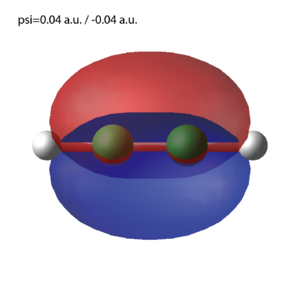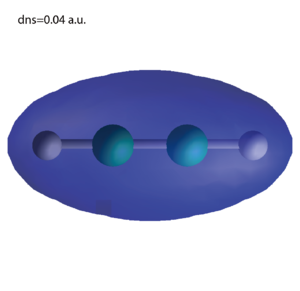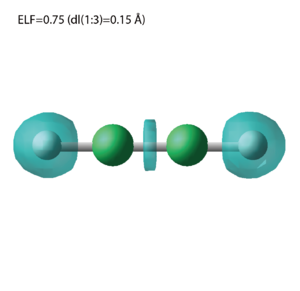Difference between revisions of "Tutorial-v.1.0.0"
| Line 15: | Line 15: | ||
We present 6 samples. | We present 6 samples. | ||
| − | First 3 samples are for an isolated molecule, acetylene C2H2. | + | First 3 samples are for an isolated molecule, acetylene C2H2. |
| + | If you are interested in learning electron dynamics calculations in isolated systems, | ||
| + | please look into these samples. | ||
In SALMON, we usually calculate the ground state DFT solution first. | In SALMON, we usually calculate the ground state DFT solution first. | ||
| − | This is shown in [[#Sample- | + | This is shown in |
| − | + | [[#Sample-1: Ground state of C2H2 molecule|Sample-1]]. | |
| + | After finishing the ground state calculations, two samples of electron dynamics calculations are prepared. | ||
| + | [[#Sample-2: Polarizability and photoabsorption of C2H2 molecule|Sample-2]] | ||
| + | shows the calculation of linear optical responses in real time, getting polarizability and photoabsorption of the molecule. | ||
| + | |||
| Line 33: | Line 39: | ||
[[File:HOMO.png#file|300px]][[File:Dns.png#file|300px]][[File:Elf.png#file|300px]] | [[File:HOMO.png#file|300px]][[File:Dns.png#file|300px]][[File:Elf.png#file|300px]] | ||
| − | == Sample-2: Polarizability of C2H2 molecule == | + | == Sample-2: Polarizability and photoabsorption of C2H2 molecule == |
* input file ([[C2H2_rt_response_v1_0_0.inp|C2H2_rt_response.inp]], [[File:C2H2_rt_response_v1_0_0.zip|C2H2_rt_response_v1_0_0.inp]]) | * input file ([[C2H2_rt_response_v1_0_0.inp|C2H2_rt_response.inp]], [[File:C2H2_rt_response_v1_0_0.zip|C2H2_rt_response_v1_0_0.inp]]) | ||
* pseudo potential files ([[C_rps.data]], [[H_rps.data]], [[File:pseudopotentials_C2H2.zip|Pseudopotentials_C2H2.zip]]) | * pseudo potential files ([[C_rps.data]], [[H_rps.data]], [[File:pseudopotentials_C2H2.zip|Pseudopotentials_C2H2.zip]]) | ||
Revision as of 10:34, 8 November 2017
In this tutorial, we explain the use of SALMON from the very beginning, taking a few examples that cover applications of SALMON in several directions. We assume that you are in the computational environment of UNIX/Linux OS. First you need to download and install SALMON in your computational environment. You may find detailed instruction in download-v.1.0.0 and install and Run-v.1.0.0.
As described in Install and Run-v.1.0.0, you are required to prepare at least input file and pseudopotential files to run SALMON. In the following, we present input files for several example calculations. We provide a brief explanation of the namelists that appear in the input files. Pseudopotential files of elements that appear in the example are also attached. We also present main output files and explain what they include.
You can run SALMON at your own environment just getting files from this page. You may also be able to modify the input file reading the explanation of the namelists.
We present 6 samples. First 3 samples are for an isolated molecule, acetylene C2H2. If you are interested in learning electron dynamics calculations in isolated systems, please look into these samples. In SALMON, we usually calculate the ground state DFT solution first. This is shown in Sample-1. After finishing the ground state calculations, two samples of electron dynamics calculations are prepared. Sample-2 shows the calculation of linear optical responses in real time, getting polarizability and photoabsorption of the molecule.
Contents
- 1 Sample-1: Ground state of C2H2 molecule
- 2 Sample-2: Polarizability and photoabsorption of C2H2 molecule
- 3 Sample-3: Electron dynamics of C2H2 molecule under pulsed electric field
- 4 Sample-4: Ground state and dielectric function of crystalline silicon
- 5 Sample-5: Ground state and electron dynamics of crystalline silicon under pulsed electric field
- 6 Sample-6: Coupled multiscale calculation of electrons and electromagnetic fields in crystalline silicon
Sample-1: Ground state of C2H2 molecule
- input file (C2H2_gs.inp, File:C2H2 gs v1 0 0.zip)
- pseudo potential files (C_rps.data, H_rps.data, File:Pseudopotentials C2H2.zip)
- an output file (C2H2.info, File:C2H2 info v1 0 0.zip) and additional output files (File:C2H2 gs output v1 0 0.zip)
- images generated by cube files (psi: highest occupied molecular orbital (HOMO), dns: electron density, ELF: electron localization function)
Sample-2: Polarizability and photoabsorption of C2H2 molecule
- input file (C2H2_rt_response.inp, File:C2H2 rt response v1 0 0.zip)
- pseudo potential files (C_rps.data, H_rps.data, File:Pseudopotentials C2H2.zip)
- output files (C2H2-RT.data, C2H2-ALP.data, File:C2H2 response data v1 0 0.zip)
Sample-3: Electron dynamics of C2H2 molecule under pulsed electric field
- input file (C2H2_rt_pulse.inp, File:C2H2 rt pulse v1 0 0.zip)
- pseudo potential files (C_rps.data, H_rps.data, File:Pseudopotentials C2H2.zip)
- output files (C2H2-RT.data, C2H2-ALP.data, File:C2H2 pulse data v1 0 0.zip)
Sample-4: Ground state and dielectric function of crystalline silicon
- input file (Si_sc_response.inp)
- pseudo potential files ( Si_rps.dat)
- output files
Sample-5: Ground state and electron dynamics of crystalline silicon under pulsed electric field
- input file ( Si_sc_pulse.inp)
- pseudo potential files ( Si_rps.dat)
- output files ( Si_sc_pulse.out, Si_sc_pulse_j_ac.out
Sample-6: Coupled multiscale calculation of electrons and electromagnetic fields in crystalline silicon
- input file ( Si_ms_pulse.inp)
- pseudo potential files ( Si_rps.dat)
- output files(Si_ms_pulse.out, Si_ms_pulse_Ac_000000.out)


